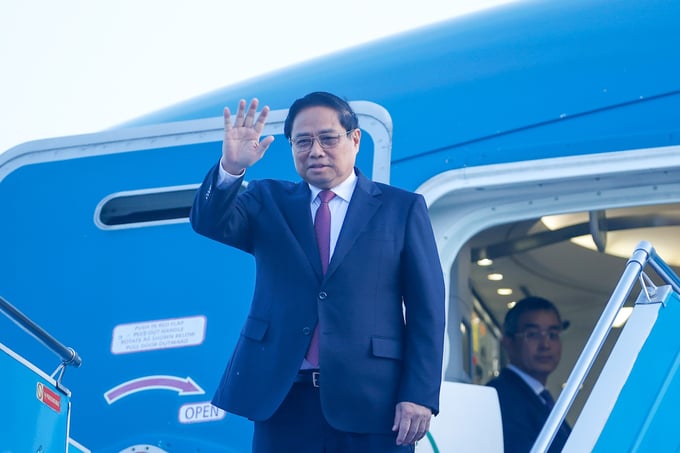November 5, 2025 | 11:54 GMT +7
November 5, 2025 | 11:54 GMT +7
Hotline: 0913.378.918
November 5, 2025 | 11:54 GMT +7
Hotline: 0913.378.918

Prime Minister Pham Minh Chinh departs for the Expanded BRICS Leaders' Summit. Photo: VGP.
The expanded BRICS Leaders' Summit is held in Kazan, Russia from October 23-24, 2024. The initial objective of BRICS was to establish a global political, economic, and financial institution that would reflect a more equitable, balanced, and representative power distribution. In the emerging multipolar world order, BRICS is seen as potentially becoming a new pillar within the multilateral system.
The 16th BRICS Summit includes the 2024 Expanded BRICS Leaders' Summit. With the theme "BRICS and the Global South: Building the Future of the World Together," the summit will concentrate on enhancing collaboration between BRICS and Global South countries to promote new growth drivers, including the digital economy, green economy, circular economy, science and technology, and innovation. The summit is objective is to establish a global governance ecosystem that is inclusive, efficient, and balanced, with a focus on the role and voice of developing countries. This will require a collaborative effort to create a more equitable world.
As of now, in addition to the senior leaders of the nine BRICS member countries, around 20 guest countries and two international organizations have confirmed their participation, including 24 heads of state attending the 2024 Expanded BRICS Summit.
The Prime Minister's attendance at the 2024 Expanded BRICS Summit is taking place in the context of the ongoing positive evolution of the traditional relationship and Comprehensive Strategic Partnership between Vietnam and Russia. Vietnam and Russia will commemorate 75 years of diplomatic relations in 2025, and this year marks the 30th anniversary of the signature of the Treaty on Basic Principles of Friendly Relations.
This voyage is a significant example of Vietnam's consistent foreign policy of independence, self-reliance, multilateralism, and diversification of foreign relations, which aims to be a reliable partner, a friend, and an active, responsible member of the international community. It is also consistent with the policy of fostering and enhancing multilateral diplomacy.
Prime Minister Pham Minh Chinh's attendance at the Expanded BRICS Summit projecting an image of a dynamic, innovative, peaceful and cooperative Vietnam. It illustrates Vietnam's responsible contributions to multilateral mechanisms, which contribute to the resolution of global challenges, the promotion of sustainable and inclusive development, the enhancement of the role and voice of developing countries on the international stage, and the further development of cooperation between Vietnam, Russia, and other countries.
Translated by Linh Linh

(VAN) Low-emission production and the conditions for granting a ‘low-emission’ label for agricultural products were among the key topics addressed by the Ministry of Agriculture and Environment at the 2025 ‘Listening to Farmers’ Forum.

(VAN) The meeting took place as Viet Nam-Australia Comprehensive Strategic Partnership continues to thrive, with both sides strengthening cooperation in agriculture, trade, and technology.

(VAN) Quang Ngai is promoting the application of digital technology to expand markets for OCOP products and enhance product quality.

(VAN) The collaboration between Viet Nam and Ireland in food system transformation goes beyond capital or technology; it is a process of co-creating knowledge, starting at the policy level.

(VAN) Action plans are leaving the conference table and reaching the fields, where provinces like Dong Thap, Son La, and Nghe An are piloting models that integrate production with livelihoods and the environment.

(VAN) A new, collaborative management approach is being piloted, replacing separate silos with coordinated action across multiple sectors to build a transparent, sustainable, and accountable system.

(VAN) The Food System Transformation (FST) is expanding into the livestock sector, where biotechnology is emerging as a new direction to reduce antibiotics, enhance quality, and improve food safety.